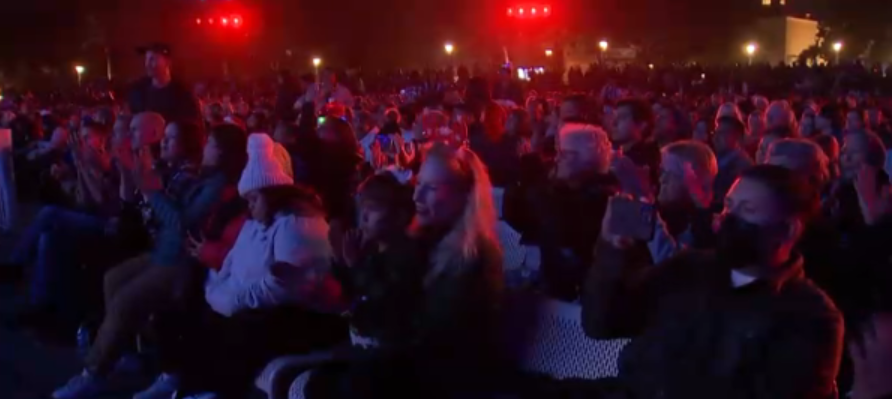With the new year comes a slew of new laws set to take effect in California. From changing the way we park to improved tenant protections, here's what you need to know.
Daylighting law
Assembly Bill 413, commonly referred to as the "daylighting" law, will change the way people park their cars. Starting Jan. 1, you will no longer be able to park within 20 feet of an unmarked or marked crosswalk. The goal is to improve visibility for pedestrians during the day, and potentially reduce the number of accidents.
Get top local stories in San Diego delivered to you every morning. >Sign up for NBC San Diego's News Headlines newsletter.
"As a pedestrian I've definitely had some close calls with people, so I feel like it might be in the better interest of everyone," said Bella Montgomery, who lives in North Park.
Montgomery acknowledges that parking is hard to come by in the neighborhood, both during the week and on the weekends. Under this new law, however, Montgomery believes that the pros might just outweigh the cons.
"That'll obviously eliminate some parking, but at the same time I think a lot of people do drive somewhat recklessly here, especially in those crosswalks and whatnot," said Montgomery.
Local
There will be a 60-day grace period before citations are issued for breaking the new law. Starting March 1, however, drivers could face a $65 fine, on top of a $12.50 administrative fee.
Here are more roadway laws coming in 2025.
Automatic subscription renewals
Another new law in 2025 will making canceling online subscriptions easier. Assembly Bill 2863 requires companies to obtain consent before automatically renewing a subscription service after July 1, 2025. Customers will also receive a reminder regarding the subscription service, as well as given information on how to cancel it.
"I think it's a good idea. That makes sense. If it's easy to sign up for something, it should be easy to cancel it, too," said Montgomery.
Up and down California's coast, housing is one of the biggest issues facing millions of renters in California. According to February numbers from the Public Policy Institute of California, renters make up the larger share of households in California at roughly 44%, which is higher than the national average of 35%.
More time for evicted tenants to respond
In 2025, tenants will have more protections come Jan. 1. Under Assembly Bill 2347, there will now be a 10-day window to respond to eviction notices. That's double the current period of five days, not including weekends or holidays. NBC 7 spoke to Catherine Rodman, a lawyer and director of Affordable Housing Advocates, about the impact that will likely have.
"This will give all those people a fighting chance to weigh in on an eviction and let the judge consider both sides of a case rather than just the landlords. So, I think it'll make a huge difference," said Rodman.
In April of 2023, the San Diego City Council voted unanimously to approve an eviction registry to collect data on the number of eviction notices being filed. It's not clear where that data is being compiled. According to investigative nonprofit inewsource, records from San Diego Superior Court show there have been roughly 750 eviction filings every month.
"Many cases go by default because tenants just can't find help or find the resources or get to court quickly enough to submit their response before they're defaulted," said Rodman.
As 2024 comes to a close, Montgomery, who currently rents an apartment in North Park, hopes that this new law will give struggling families in San Diego a better chance at keeping a roof over their heads.
"Housing can be pretty last minute here, at least in my experience. I've always kind of found my places a week or two before, so I feel like this should give people enough time to kind of figure out their next move," said Montgomery.
Credit card reports cannot show medical debt
Under Senate Bill 1061, medical debt will be banned from appearing on peoples' credit card reports. Assembly Bill 2017 will prohibit state-regulated banks from charging overdraft fees when customers go to withdraw money and do not have the sufficient funds in their account. State-regulated banks in San Diego include institutions like Community Valley Bank, Endeavor Bank, and First Foundation bank, just to name a few.
Restrictions on outing students
One big change coming to California is AB-1955, better known as the Safety Act.
It prevents educators from being required to disclose information related to students' sexual orientation, gender identity or expression without the student's consent, unless otherwise required by law.
Despite existing laws that already prohibit school districts from outing students without their consent, Bay Area Attorney Adanté Pointer, who specializes in civil rights, said the Safety Act helps set it in stone with clarity.
"[In previous laws,] it's already been determined to be a student's privacy right, wherein the student's teachers and administrators are not allowed to provide information to parents as it relates to outing the students," Pointer said. "The new law essentially codifies that and makes it much more enhanced."
Paid and sick leave
Changes are also coming to workplaces across the state, with AB-2123 and AB-2499 expanding paid sick and family leave.
AB-2499 specifically applies to when an employee or a family member of the employee is a victim of a crime or violence. The law allows the employee to take paid state leave time off for issues that relate to them being a victim, instead of the typical process of having to take two weeks out of vacation time before being able to tap into the paid state family leave.
"You can essentially preserve your vacation time and use paid state leave, family leave, in order to take care of your family emergencies," Pointer said.
Added accommodation for these employees is also required by the employer, ensuring that the employee is safe and allow time off for them to attend court in any type of proceeding.
Driver's license requirements
Another law impacting workplaces is SB-1100, which prohibits employers from requiring a valid driver license, unless essential for the job. The law addresses discrimination against individuals without licenses, previously potentially disqualified from new jobs.
"The new law would essentially tell employers, look, you do not need to ask nor can you ask about a person whether they have a valid license unless driving is an essential or required function of the job," Pointer said.



